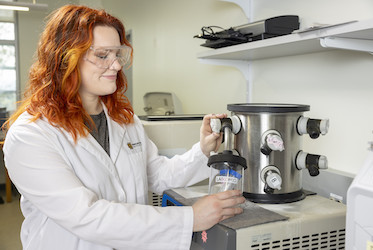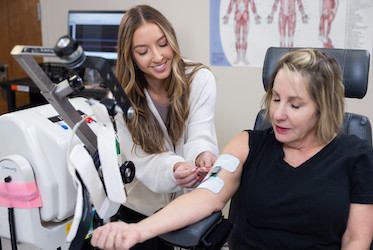
Bridging the Gap
KENNESAW, Ga. | May 1, 2019
Graduate student’s personal trauma fuels research interest
Tequila Porter can still hear her mother’s encouraging words, despite losing her mom more than a decade ago.
“When I was younger, I always said I wanted to be a doctor,” recalled Porter, who will earn her master’s in integrative biology from Kennesaw State next week. “My mom was the one who said to ‘go for it.’ She encouraged us kids to volunteer and participate in things.”
Today, 25-year old Porter is part of KSU’s Peach State Bridges to the Doctorate program, a project funded by the National Institutes of Health. The University accepts four students to the program each year, which prepares the next generation of biomedical doctors and researchers, bridging the gap between education and finances.

Porter was 14 years old, the oldest female among five siblings, when her mom died suddenly. She recalled having to live with her father after her mother’s death and how it was a different atmosphere.
“I knew what I wanted to do, and to be the first generation to want to go to college and not have support was really tough, especially in high school,” Porter said. “There was a lack of professional female role models around me, but I was very self-motivated.”
As she applied to colleges, her goal was to leave Asheville, North Carolina, and she jumped at the chance, taking a scholarship at Winston-Salem State University for her undergraduate study.
She was a college junior when her maternal grandfather finally explained to Porter how her mother had died. Originally told that her 33-year old mother suffered from complications of an enlarged heart, a condition Porter knew her mother had since birth, in reality, Porter’s mother died from a drug overdose.
“That set a fire to me,” Porter said, who then set out to study women’s health and drug addiction. While working on her bachelor’s degree, she began research in the area of women’s health, exploring breast cancer among African-American women, specifically how a certain gene within this population was formed.
When Porter came to Kennesaw State to earn her master’s degree, biology researchers learned about her interest in public health and quickly connected her with Evelina Sterling, assistant professor of sociology, who conducts research in health disparities.
Under Sterling’s guidance, Porter was encouraged to go into the community to conduct field research by interviewing women about health issues and to meet with representatives from physicians’ offices, treatment centers and the health department.
“I shied away from telling my own story in the field at first because I didn’t feel like I conquered anything… my mom died from a drug overdose,” she said. “I didn’t want people to pity me.”
But when she shared her story, she connected at a very different level with the women she was interviewing, her professor said.
“In addition to her own research, Tequila's personal experiences and intellectual curiosity made her a perfect fit to also help me gather difficult data from a difficult population for my research – pregnant opioid users in rural North Georgia,” Sterling said. “There is still a lot of stigma around drug use and addiction disorders so this always makes people wary to talk to researchers. Tequila was able to provide a fresh perspective to the data analysis, and she was able to problem-solve some of the challenges in collecting accurate data about drug use that she hopes to address during her doctoral work.”
Porter explored both rural and urban populations, and looked specifically at differences in these groups, examining the resources, policies, techniques and protocols available.
“The health experts would tell me, ‘we know women are suffering,’ but they didn’t have the data to support what they know from their interactions with these women,” she explained, adding that because of the lack of data, surveying and compiling information with 84 variables was key to her research.
“I wanted to know where the gaps are,” Porter said. “Only then will we know how to address these health issues for women.”
For Porter, losing her mother to a drug overdose has shaped her own mindset and set her on a career path to help other women.
“I’m now able to relate my mom’s experience and share this with other women,” Porter said. “I know what it’s like to live in the projects. I have lived there my entire life.”
But Porter is determined to not let her past define her and calls her Kennesaw State journey “a blessing.”
Her mother’s words continue to inspire and motivate Porter to push toward her dream of earning a doctorate. This fall, Porter will head to the University of California-Davis to work on her Ph.D. in healthcare leadership.
– Tiffany Capuano
Photos by Rob Witzel
Related Stories
A leader in innovative teaching and learning, Kennesaw State University offers undergraduate, graduate and doctoral degrees to its more than 45,000 students. Kennesaw State is a member of the University System of Georgia with 11 academic colleges. The university’s vibrant campus culture, diverse population, strong global ties and entrepreneurial spirit draw students from throughout the country and the world. Kennesaw State is a Carnegie-designated doctoral research institution (R2), placing it among an elite group of only 7 percent of U.S. colleges and universities with an R1 or R2 status. For more information, visit kennesaw.edu.



















